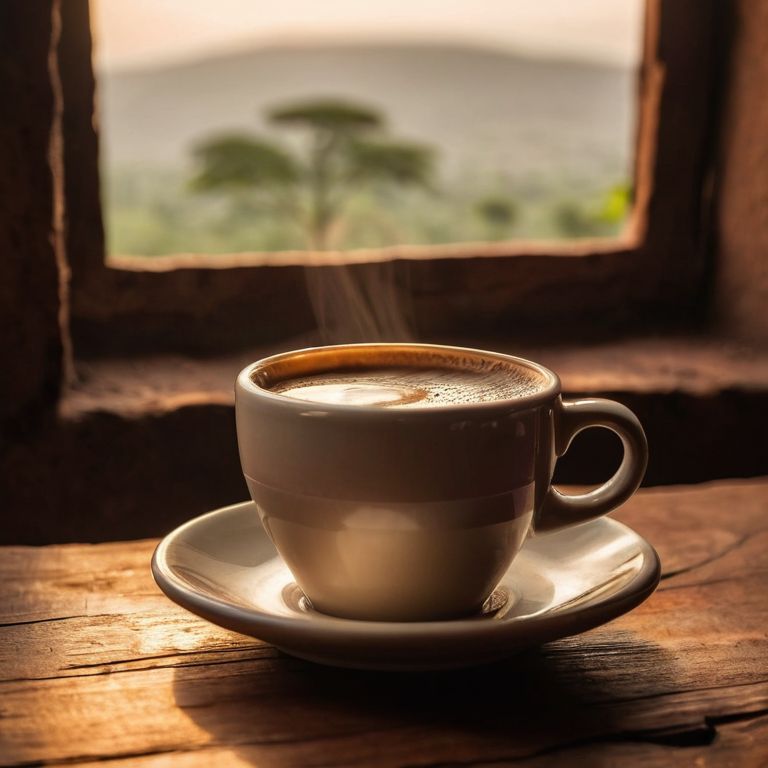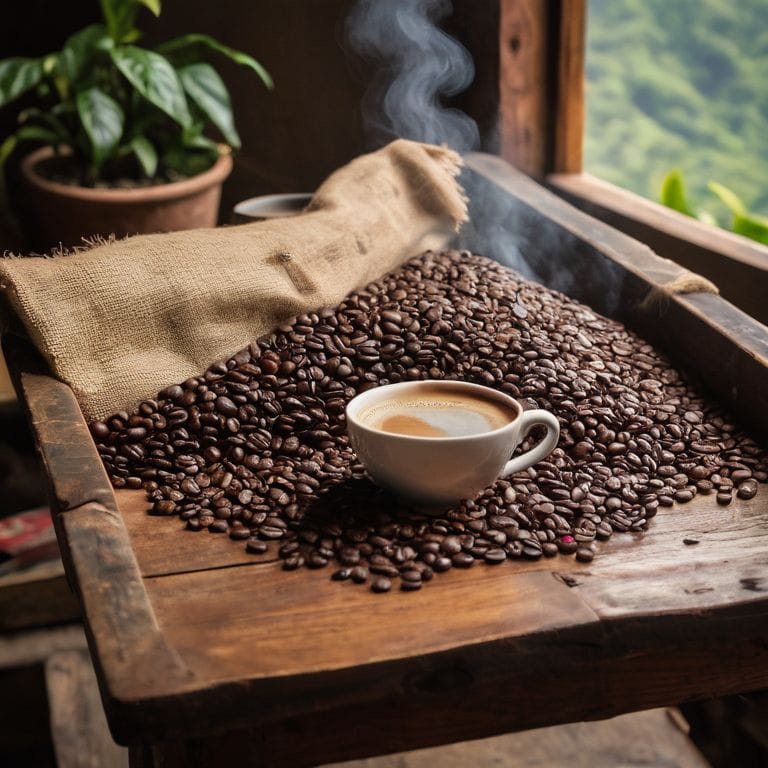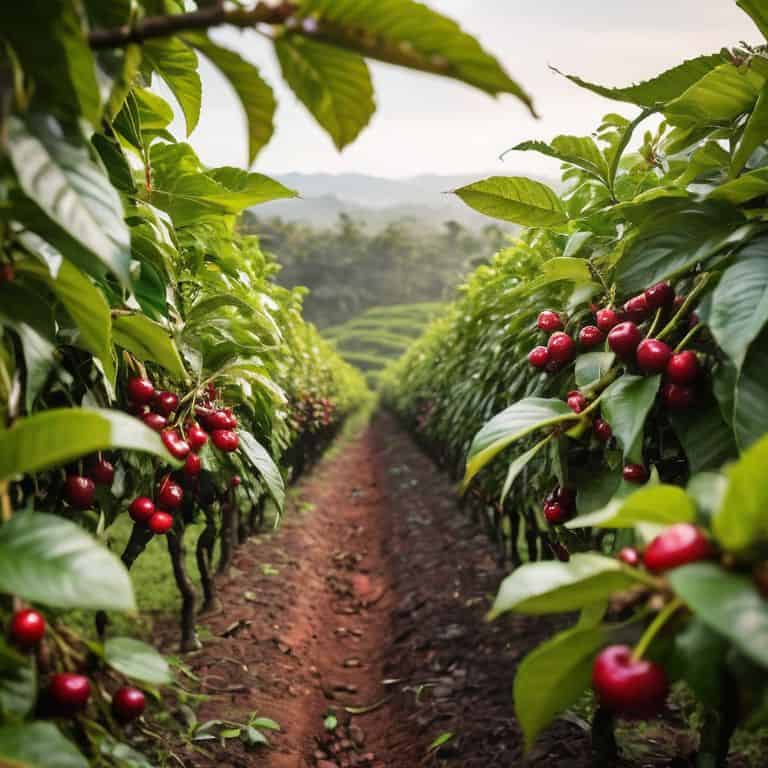I still remember the first time I tasted the flavor profile of Rwandan coffee – it was like a symphony of flavors, with notes of bright citrus and sweet honey that transported me straight to the rolling hills of Kivu. But, as I delved deeper into the world of specialty coffee, I began to notice that many people were oversimplifying the complexity of Rwandan coffee, reducing it to a set of generic flavor notes. This oversimplification not only does a disservice to the coffee itself, but also to the hardworking farmers who cultivate it.
As someone who’s had the privilege of working directly with coffee farmers in Rwanda, I want to share my hands-on experience with you, and provide a nuanced understanding of the flavor profile of Rwandan coffee. In this article, I’ll take you on a journey to the heart of Rwanda’s coffee country, where you’ll discover the _rich terroir_ and _diverse processing methods_ that make Rwandan coffee truly unique. I’ll cut through the hype and jargon, and give you a straightforward, no-nonsense guide to appreciating the incredible flavors of Rwandan coffee, from the _soil acidity_ to the _cherries_ themselves.
Table of Contents
- Unveiling Rwandan Coffee
- The Flavor Profile of Rwandan Coffee
- Unlocking the Essence of Rwandan Coffee: 5 Key Tips to Enhance Your Palate
- Key Takeaways from the Flavor Profile of Rwandan Coffee
- A Reflection on Rwandan Coffee's Essence
- Embracing the Essence of Rwandan Coffee
- Frequently Asked Questions
Unveiling Rwandan Coffee
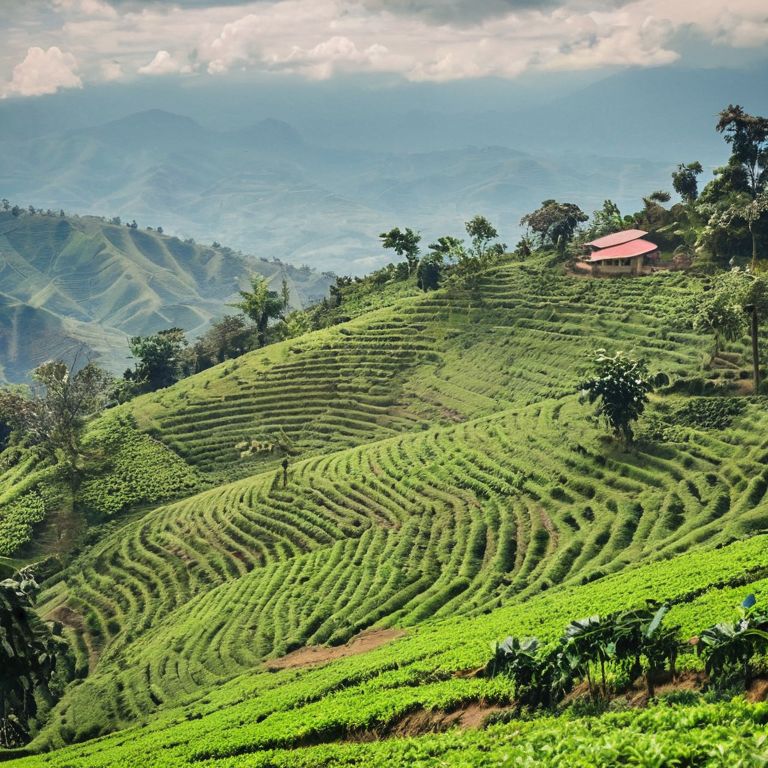
As I reflect on my visits to Rwandan coffee farms, I’m reminded of the distinctive terroir that sets this region apart. The country’s unique combination of high altitude, rich soil, and moderate climate creates an ideal environment for coffee production. I recall walking through the rolling hills of Kivu, surrounded by lush green coffee plants, and feeling a deep connection to the land and its people.
During my farm tours, I’ve had the opportunity to witness firsthand the careful processing methods employed by Rwandan farmers. The washed processing method, in particular, is notable for its ability to bring out the coffee’s bright acidity and fruit notes. As I cupped the coffee, I was struck by the flavor notes of citrus and honey, which seemed to dance on my palate. The cupping notes revealed a coffee that was both refined and full-bodied, with a hint of earthy undertones.
My experiences in Rwanda have left an indelible mark on my understanding of coffee. The rwandan coffee bean characteristics are a testament to the region’s unique climate and soil conditions. As I roast these beans, I’m constantly aware of the delicate balance between flavors and the need to coax out the optimal flavor profile. Whether through home roasting experiments or commercial roasts, I’m always seeking to capture the essence of Rwanda’s coffee region and share it with others.
Coffee Flavor Notes From Rwandas Hills
As I reflect on my experiences with Rwandan coffee, I’m reminded of the distinctive flavor notes that set it apart. The cups I’ve had the pleasure of savoring have consistently showcased a bright, snappy acidity, balanced by a smooth, tea-like body. This is a coffee that will keep you engaged, with each sip revealing new nuances to explore.
The flavor profile of Rwandan coffee is marked by terroir-driven characteristics, with notes of citrus, stone fruit, and a hint of earthy sweetness. Whether you’re a seasoned coffee connoisseur or just discovering the world of specialty coffee, Rwandan coffee is sure to delight, offering a truly immersive sensory experience that will leave you wanting more.
Rwandan Coffee Bean Characteristics Revealed
As I delve into the world of Rwandan coffee, I’m struck by the unique characteristics of its beans. The processing methods used in Rwanda play a significant role in shaping the flavor profile of its coffee, with many farms opting for a combination of washed and natural techniques to bring out the best in their cherries.
The flavor notes in Rwandan coffee are often described as bright and nuanced, with hints of citrus and honey that are perfectly balanced by the region’s distinct terroir.
The Flavor Profile of Rwandan Coffee
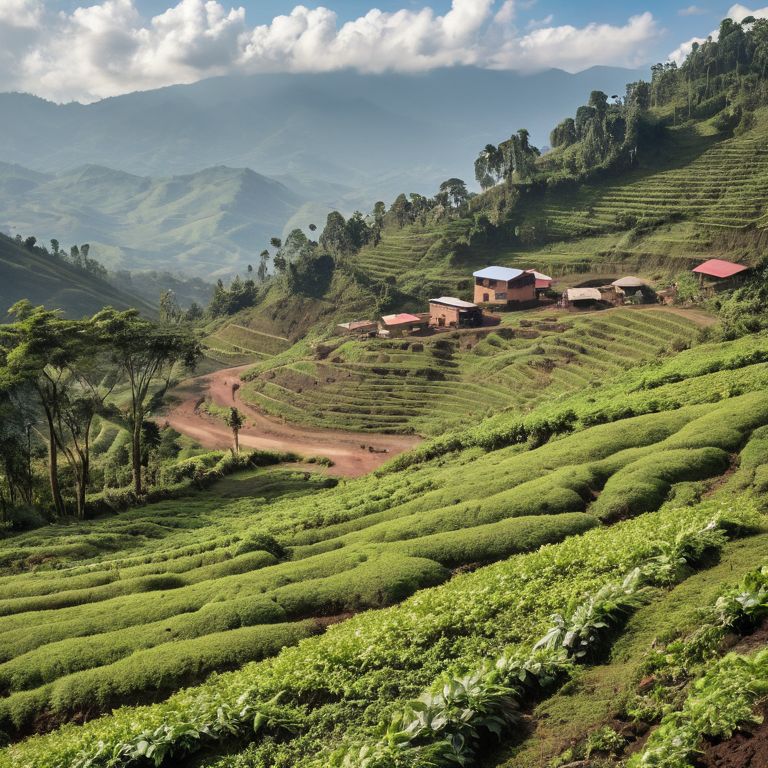
As I reflect on my experiences with Rwandan coffee, I’m reminded of the intricate balance of flavors that this region is known for. The coffee flavor notes from Rwanda are a masterclass in subtlety, with hints of citrus and honey that evoke the sun-kissed hills of Kivu. When I’ve had the chance to visit Rwandan coffee farms, I’ve been struck by the careful attention to detail that farmers bring to their craft, from the meticulous harvesting of cherries to the precise processing methods that coax out the unique characteristics of each bean.
The processing methods used in Rwanda are a key factor in shaping the flavor profile of these coffees. Natural processing, in particular, allows the coffee to retain a certain fruitiness and depth that is hard to find elsewhere. As I’ve cupped coffees from various Rwandan coffee farm tours, I’ve been impressed by the consistency and quality of the beans, with cupping notes that often feature floral and wine-like undertones.
In the cup, Rwandan coffee is a true delight, with a silky smooth body and a finish that lingers pleasantly. Whether you’re a seasoned coffee connoisseur or just discovering the joys of specialty coffee, Rwandan coffee is sure to impress. With its unique combination of climate, soil, and careful processing, this region produces coffees that are truly greater than the sum of their parts, offering a glimpse into the rich terroir that underlies every great cup of coffee.
Processing Methods Impact on Cupping Notes
As I reflect on my experiences with Rwandan coffee, I’m reminded that the processing method plays a pivotal role in shaping the flavor profile. The way the cherries are handled after harvesting can greatly impact the final cupping notes. I’ve seen firsthand how different methods can bring out unique characteristics in the beans.
The washed processing method, in particular, is notable for its ability to accentuate the coffee’s brightness and acidity. This method allows for a cleaner flavor profile, with notes of citrus and floral hints that are unmistakably Rwandan.
Rwanda Coffee Region Climate and Farm Tours
As I reflect on my visits to Rwandan coffee farms, I’m reminded of the region’s unique terroir. The combination of high altitudes, rich volcanic soils, and distinct wet and dry seasons all contribute to the country’s exceptional coffee. I’ve had the privilege of witnessing firsthand the meticulous care that farmers bring to their crops, from carefully hand-picking ripe cherries to meticulously sorting and processing the beans.
My farm tours have taken me through the rolling hills and scenic landscapes of Rwanda’s coffee country. Along the way, I’ve gained a deeper appreciation for the challenges and triumphs of coffee production in this region. From the misty mornings in the Kivu highlands to the sun-kissed afternoons in the western provinces, every moment has been a sensory delight, with the aroma of freshly harvested coffee filling the air and the sound of laughter and conversation echoing through the hills.
Unlocking the Essence of Rwandan Coffee: 5 Key Tips to Enhance Your Palate
- Appreciate the nuances of Rwandan coffee by understanding the impact of processing methods on the final flavor, with washed coffees offering brighter acidity and natural coffees presenting fruity and floral notes
- Experiment with different roast levels to find your perfect balance, as lighter roasts can accentuate the coffee’s citrus and tea-like flavors, while medium to darker roasts bring out deeper, richer tones
- Take a sensory journey through the regions of Rwanda, from the northern districts of Rulindo and Gakenke to the southern areas of Nyamagabe and Nyaruguru, each with its unique terroir and flavor profile
- Pair your Rwandan coffee with complementary foods to elevate the experience, such as pairing the bright acidity of a washed Rwandan coffee with sweet pastries or the rich flavors of a natural Rwandan coffee with dark chocolate
- Invest in high-quality, freshly roasted beans and grind them just before brewing to ensure the optimal expression of Rwandan coffee’s delicate flavor notes, which can range from hints of citrus and honey to deeper notes of earth and spice
Key Takeaways from the Flavor Profile of Rwandan Coffee
As I reflect on my journeys to Rwanda, I’m reminded that the country’s coffee is a masterclass in balance, with flavor notes that seamlessly blend bright citrus, sweet honey, and earthy undertones, making every sip a testament to the region’s unique terroir
The processing methods used in Rwanda, particularly the washed and natural techniques, play a pivotal role in shaping the final flavor profile, with washed coffees offering a cleaner, more acidic taste and natural coffees presenting a fruitier, more full-bodied experience
From the rolling hills of Kivu to the sun-kissed farms of Rulindo, Rwanda’s diverse climate and regions contribute to a rich tapestry of flavors, inviting coffee enthusiasts to explore and appreciate the distinct characteristics of each area, and the diligent work of the farmers who bring these extraordinary cherries to life
A Reflection on Rwandan Coffee's Essence
The flavor profile of Rwandan coffee is akin to a masterfully woven tapestry, where each thread of citrus, honey, and earthy undertones intertwines to tell a story of the land, the people, and the passion that nurtures every cherry from seed to cup.
Samuel Jones
Embracing the Essence of Rwandan Coffee
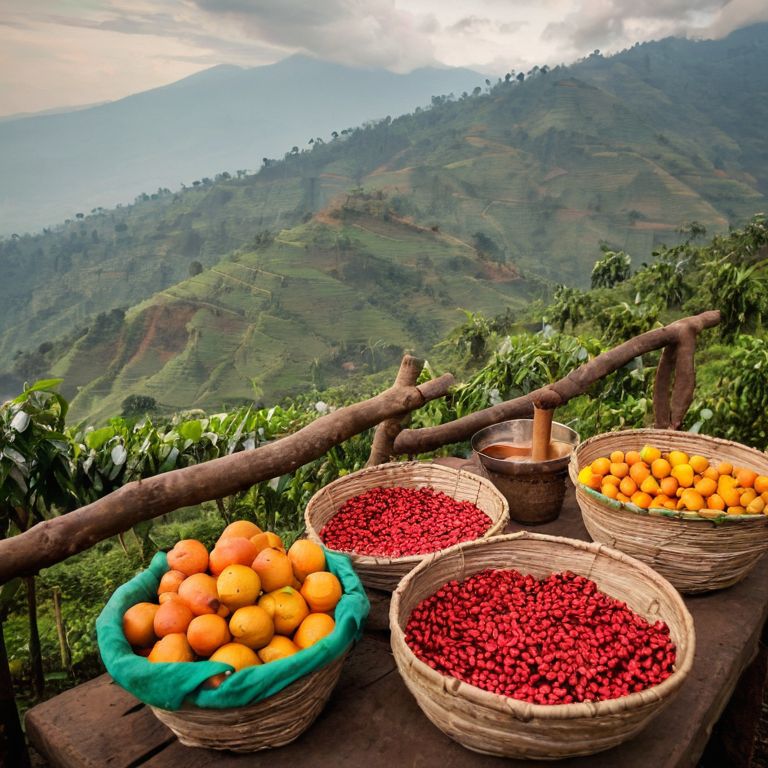
As I reflect on the flavor profile of Rwandan coffee, I’m reminded of the intricate balance of bright citrus and sweet honey notes that dance on the palate. Our journey through the hills of Kivu has unveiled the distinct characteristics of Rwandan coffee beans, from their high altitude to the meticulous processing methods that impact the cupping notes. We’ve also explored how the region’s climate and farm tours offer a unique glimpse into the lives of coffee farmers, who work tirelessly to bring us these incredible flavor notes. Whether you’re a seasoned coffee connoisseur or just discovering the world of specialty coffee, Rwandan coffee is sure to leave a lasting impression.
As you sip your next cup of Rwandan coffee, I encourage you to slow down and appreciate the terroir that has gone into crafting this exquisite beverage. Remember the dedication of the coffee farmers, the richness of the soil, and the careful processing that has brought out the full potential of these cherries. Let the flavors transport you to the rolling hills of Rwanda, and let the story of this coffee inspire you to appreciate the beauty in every cup. By embracing the essence of Rwandan coffee, we not only indulge our senses but also pay tribute to the hard work and passion of those who bring us this delicious elixir.
Frequently Asked Questions
How does the unique combination of volcanic soil and high altitude in Rwanda impact the flavor profile of its coffee?
The volcanic soil and high altitude in Rwanda create a distinct flavor profile, with notes of blackcurrant and wine. The soil’s acidity brings out a bright, snappy acidity, while the altitude contributes to a slower maturation process, resulting in a more complex and refined cup. It’s a truly unique terroir that sets Rwandan coffee apart.
What role do traditional processing methods, such as washing or natural drying, play in shaping the distinct flavor notes of Rwandan coffee?
For me, traditional processing methods are the unsung heroes of Rwandan coffee’s flavor profile. Washing brings out bright acidity and fruit notes, while natural drying coaxes out deeper, sweeter flavors. It’s a delicate balance, but when done right, it’s pure magic – the terroir and cherries’ true essence shine through.
Can the flavor profile of Rwandan coffee vary significantly depending on the specific region or farm within the country, and if so, how?
Absolutely, the flavor profile of Rwandan coffee can vary significantly depending on the region or farm. I’ve seen it myself on my visits to Kivu, where the high-altitude farms produce coffees with brighter acidity, while those from lower elevations have a richer, earthier tone. Each farm’s unique terroir and processing methods also play a huge role in shaping the final flavor.
